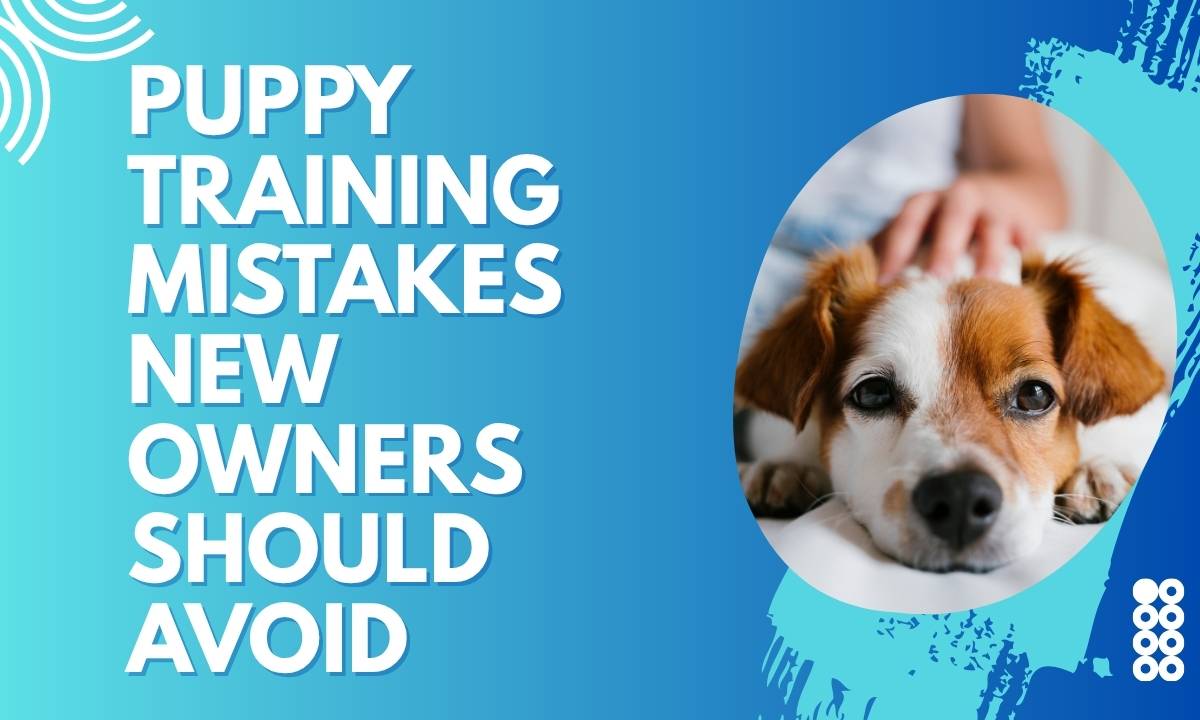Bringing a new puppy home is one of the most exciting experiences in any dog lover’s life. The first few months are filled with joy, learning, and of course, challenges. Puppy training is an essential part of raising a well-behaved and happy dog, but many new owners unintentionally make mistakes that can lead to behavioral problems later. Understanding what not to do can be just as important as knowing what to do. In this article, we’ll explore the most common puppy training mistakes new owners should avoid and how to build a strong foundation for your pup’s lifelong obedience and happiness.
Starting Training Too Late
One of the biggest mistakes new puppy owners make is waiting too long to start training. Many believe that puppies should be older before they can learn commands, but training should begin as soon as the puppy comes home, usually around eight weeks old. At this young age, puppies are like sponges — they absorb everything quickly. Early training helps them understand boundaries, learn acceptable behavior, and adapt to household routines. Waiting too long can make it harder to correct unwanted habits like biting, jumping, or ignoring commands later in life.
Inconsistent Rules and Commands
Another major issue is inconsistency. Puppies thrive on clear and consistent communication. If one family member allows the puppy on the couch while another forbids it, the dog becomes confused about what is right or wrong. Similarly, using different words for the same command — for example, “come here” vs. “come” — can make it difficult for your puppy to understand what you want. Consistency in tone, language, and expectations is key to effective puppy training. Every household member should follow the same set of rules so the puppy can learn faster and stay well-behaved.
Punishing Instead of Teaching
Punishment is one of the most harmful mistakes in puppy training. Yelling, hitting, or scolding a puppy only causes fear and anxiety, damaging the bond between dog and owner. Puppies do not respond well to negative reinforcement; they simply become afraid of you rather than understanding what they did wrong. Instead, focus on positive reinforcement. Reward your puppy with treats, praise, or affection when they display the desired behavior. This approach builds trust and encourages your dog to repeat good behavior willingly.
Neglecting Socialization
Socialization is a critical step in raising a confident and friendly puppy. Many new owners forget that their dog needs to experience new people, animals, and environments during the early months. Puppies that are not properly socialized may grow up fearful or aggressive in unfamiliar situations. Introduce your puppy to a variety of sights, sounds, and experiences in a calm and controlled manner. Trips to the park, short car rides, and meeting other dogs can make a big difference in developing a balanced, social companion.
Overlooking Leash Training Early On
Teaching your puppy to walk on a leash is not just about going for walks — it’s about safety and control. Many new owners wait until their dog is older before introducing a leash, which can result in pulling, resistance, or fear of restraint. Begin leash training indoors or in a quiet area before moving outside. Allow your puppy to get comfortable with the leash and collar, and encourage them to walk beside you calmly. Early leash training sets the foundation for enjoyable walks and prevents frustration for both dog and owner later.
Not Being Patient Enough
Training a puppy requires patience and repetition. Some owners expect their puppy to master commands in a day or two, which leads to frustration and inconsistent training. Remember that puppies have short attention spans and need time to learn. Progress may seem slow at first, but consistent short sessions each day yield better long-term results than long, stressful training sessions. Celebrate small victories, stay calm when your puppy makes mistakes, and focus on gradual improvement. Patience is one of the most important traits of a successful dog owner.
Ignoring Mental Stimulation and Boredom
Puppies are naturally curious and energetic. While physical exercise is important, mental stimulation is just as crucial. New owners often forget to engage their puppy’s brain with problem-solving games, puzzle toys, or obedience exercises. A bored puppy will often find its own entertainment — usually by chewing on shoes, digging in the yard, or barking excessively. Incorporating play-based training, interactive toys, and frequent engagement keeps your puppy mentally sharp and satisfied. A well-stimulated dog is far less likely to develop destructive habits.
Skipping Routine and Structure
Dogs thrive on routine. A structured schedule for feeding, potty breaks, playtime, and rest helps your puppy feel secure and understand what to expect each day. Many owners make the mistake of training only when they have time or when the puppy misbehaves. This lack of routine confuses the dog and slows learning. Setting up a consistent daily schedule makes training easier, builds confidence, and reduces anxiety. Over time, your puppy will naturally follow the household rhythm, making life smoother for everyone.
Final Thoughts
Puppy training is both rewarding and challenging. Mistakes are natural, but awareness and consistency can make all the difference. The key is to start early, remain patient, and focus on positive reinforcement rather than punishment. Every interaction with your puppy teaches them something, whether you realize it or not. By avoiding these common training errors, you’ll set your puppy up for lifelong success, build a strong bond, and raise a dog who is confident, obedient, and a joy to live with. Training is not just about commands — it’s about communication, trust, and love that grows with every day you spend together.

